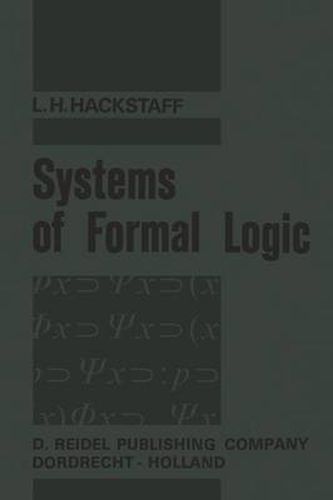Readings Newsletter
Become a Readings Member to make your shopping experience even easier.
Sign in or sign up for free!
You’re not far away from qualifying for FREE standard shipping within Australia
You’ve qualified for FREE standard shipping within Australia
The cart is loading…






This title is printed to order. This book may have been self-published. If so, we cannot guarantee the quality of the content. In the main most books will have gone through the editing process however some may not. We therefore suggest that you be aware of this before ordering this book. If in doubt check either the author or publisher’s details as we are unable to accept any returns unless they are faulty. Please contact us if you have any questions.
The present work constitutes an effort to approach the subject of symbol ic logic at the elementary to intermediate level in a novel way. The book is a study of a number of systems, their methods, their rela tions, their differences. In pursuit of this goal, a chapter explaining basic concepts of modern logic together with the truth-table techniques of definition and proof is first set out. In Chapter 2 a kind of ur-Iogic is built up and deductions are made on the basis of its axioms and rules. This axiom system, resembling a propositional system of Hilbert and Ber nays, is called P +, since it is a positive logic, i. e. , a logic devoid of nega tion. This system serves as a basis upon which a variety of further sys tems are constructed, including, among others, a full classical proposi tional calculus, an intuitionistic system, a minimum propositional calcu lus, a system equivalent to that of F. B. Fitch (Chapters 3 and 6). These are developed as axiomatic systems. By means of adding independent axioms to the basic system P +, the notions of independence both for primitive functors and for axiom sets are discussed, the axiom sets for a number of such systems, e. g. , Frege’s propositional calculus, being shown to be non-independent. Equivalence and non-equivalence of systems are discussed in the same context. The deduction theorem is proved in Chapter 3 for all the axiomatic propositional calculi in the book.
$9.00 standard shipping within Australia
FREE standard shipping within Australia for orders over $100.00
Express & International shipping calculated at checkout
This title is printed to order. This book may have been self-published. If so, we cannot guarantee the quality of the content. In the main most books will have gone through the editing process however some may not. We therefore suggest that you be aware of this before ordering this book. If in doubt check either the author or publisher’s details as we are unable to accept any returns unless they are faulty. Please contact us if you have any questions.
The present work constitutes an effort to approach the subject of symbol ic logic at the elementary to intermediate level in a novel way. The book is a study of a number of systems, their methods, their rela tions, their differences. In pursuit of this goal, a chapter explaining basic concepts of modern logic together with the truth-table techniques of definition and proof is first set out. In Chapter 2 a kind of ur-Iogic is built up and deductions are made on the basis of its axioms and rules. This axiom system, resembling a propositional system of Hilbert and Ber nays, is called P +, since it is a positive logic, i. e. , a logic devoid of nega tion. This system serves as a basis upon which a variety of further sys tems are constructed, including, among others, a full classical proposi tional calculus, an intuitionistic system, a minimum propositional calcu lus, a system equivalent to that of F. B. Fitch (Chapters 3 and 6). These are developed as axiomatic systems. By means of adding independent axioms to the basic system P +, the notions of independence both for primitive functors and for axiom sets are discussed, the axiom sets for a number of such systems, e. g. , Frege’s propositional calculus, being shown to be non-independent. Equivalence and non-equivalence of systems are discussed in the same context. The deduction theorem is proved in Chapter 3 for all the axiomatic propositional calculi in the book.